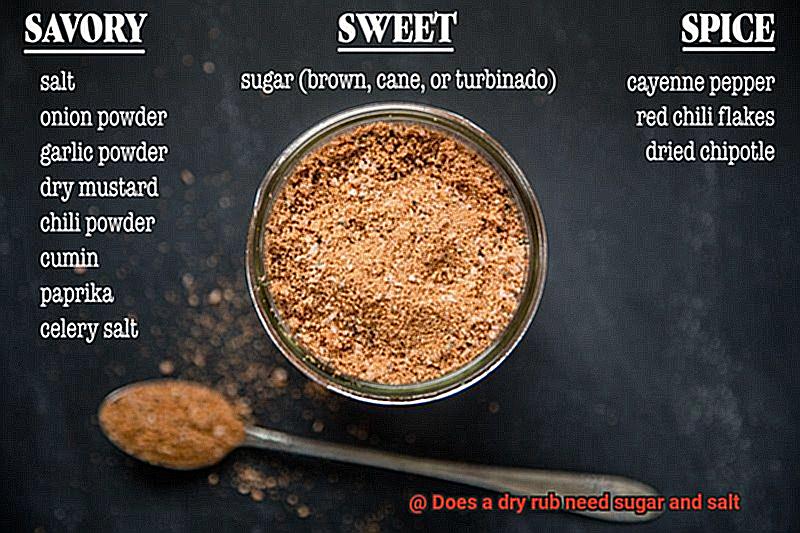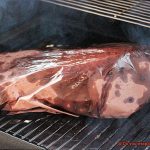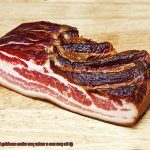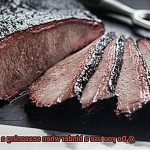Get ready to spice up your barbecue game because today we’re diving deep into the sizzling debate: does a dry rub really need sugar and salt? Brace yourself for a mouthwatering journey as we explore the pros and cons of these flavor powerhouses, and maybe even uncover some sneaky alternatives along the way.
So, grab your tongs and let’s get grilling – it’s time to unlock the secrets behind the perfect dry rub.
Contents
What is a Dry Rub?
When it comes to grilling, a dry rub is a game-changer. It transforms your favorite meats, poultry, seafood, and vegetables into culinary masterpieces, bursting with depth and complexity. But what exactly is a dry rub? Let’s dive into the tantalizing world of dry rubs and uncover the secrets behind their mouthwatering flavors.
Unveiling the Essence of a Dry Rub:
A dry rub is a magical concoction of dried herbs, spices, and other flavorings that brings life to your food before it hits the grill or oven. Unlike wet marinades, dry rubs work their magic without any liquids. Instead, they rely on the power of nature’s pantry to infuse your dish with an explosion of taste.
The Symphony of Flavors:
The beauty of a dry rub lies in its versatility. You have the freedom to customize your blend based on your taste preferences and dietary needs. Common ingredients found in dry rubs include oregano, thyme, rosemary, basil, paprika, cumin, chili powder, black pepper, garlic powder, onion powder, mustard powder, and even dried citrus zest. These vibrant elements combine to create a symphony of flavors that dance harmoniously on your palate.
The Method Behind the Magic:
Using a dry rub is an art form in itself. It starts by generously coating your meat or vegetables with the seasoning blend. You can either massage it into the surface or sprinkle it like stardust from a shaker. After applying the rub, allow it to work its magic by marinating or resting the food. This lets the flavors penetrate deep into every fiber, transforming ordinary ingredients into extraordinary culinary creations.
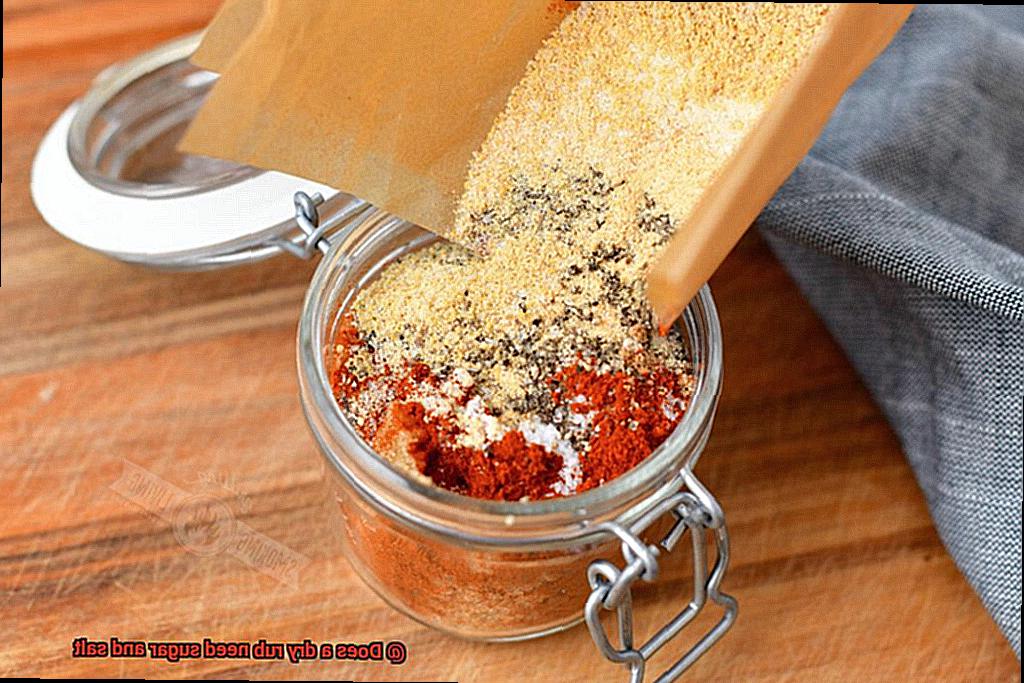
Achieving Balance:
While many dry rub recipes include salt and sugar as key components, they are not essential for a flavorful experience. If you’re looking to reduce your salt intake, focus on incorporating herbs and spices that pack a punch.
Paprika, chili powder, garlic powder, onion powder, cumin, and black pepper are just a few examples of flavor powerhouses that bring your rub to life. As for sweetness, natural alternatives like stevia or monk fruit extract provide a touch of sweetness without the calories or impact on blood sugar levels. For those who desire complexity, honey or maple syrup can add a delightful twist to your rubs.
The Grill Master’s Playground:
Dry rubs are the playground of grill masters and barbecue enthusiasts. When exposed to high heat, the rub forms a tantalizing crust on the surface of the food, known as the “bark.” This heavenly bark not only adds texture but also seals in moisture and intensifies the flavors, creating a sensory experience that is beyond compare.
Why Use Sugar in a Dry Rub?
When it comes to grilling, the secret to mouthwatering meats lies in the rub. And one ingredient that plays a starring role in many dry rub recipes is sugar. Yes, you heard it right – sugar. But why use sugar in a dry rub? Let’s dig in and find out.
First and foremost, sugar adds a touch of sweetness to your grilled dishes. It balances out the savory and spicy flavors of the rub, creating a harmonious taste that will make your taste buds sing. Imagine sinking your teeth into a perfectly grilled piece of meat with just the right amount of sweetness. It’s like taking a flavor vacation.
But sugar does more than just add sweetness. When the heat hits your meat, the sugar in the dry rub works its magic by creating a delicious caramelized crust on the surface. This crust not only adds texture but also enhances the overall appearance of your dish. Just imagine that beautiful brown color, glistening with flavor.
One of the reasons why sugar is so effective at creating that caramelized crust is because it has a lower melting point compared to salt. This means that it quickly caramelizes during cooking, resulting in a quicker development of flavor. So not only does it make your food look good, but it also makes it taste even better.
But wait, there’s more. Sugar can also help counteract any bitter or harsh flavors that might be present in the rub or even in the meat itself. It acts as a flavor enhancer, making sure that every bite is bursting with deliciousness.
And here’s an added bonus – sugar also helps tenderize your meat. When sugar comes into contact with meat, it breaks down its protein structure, resulting in a more tender and juicy final product. So not only will your grilled dishes be bursting with flavor, but they’ll also be melt-in-your-mouth tender.
Now, it’s important to note that different types of sugar can be used in a dry rub, each offering its own unique flavor profile. For example, brown sugar adds a lovely molasses-like taste, while white sugar offers a cleaner sweetness. So you can play around with different sugars to find your perfect flavor combination.
Why Use Salt in a Dry Rub?
Grilling enthusiasts know that a dry rub is the secret to taking your meats to the next level. While sugar may steal the spotlight, it’s time to uncover the unsung hero of flavor – salt. In this article, we’ll explore why salt is a key ingredient in a dry rub for grilling and how it enhances the flavor and texture of your meats.
Enhancing Flavor:
Salt acts as a flavor enhancer, bringing out the natural taste of the meat and balancing its flavors. It adds depth and intensity to the dry rub, making every bite a burst of deliciousness. When choosing salt for your dry rub, consider using kosher salt or sea salt for their clean and distinct flavors that perfectly complement the other spices in your rub.
Tenderizing Effect:
Tough cuts of meat can become tender and juicy with the help of salt. The proteins in the meat are broken down by the salt, resulting in a more tender final product. This is especially crucial when grilling tougher cuts like brisket or ribs. So next time you’re planning a barbecue, remember that salt is not only a flavor enhancer but also a secret tenderizing agent.
Preserving the Meat:
Salt also plays an important role in preserving the meat. It draws out moisture from the surface of the meat, creating a dry environment that inhibits bacterial growth. This helps extend the shelf life of the meat and prevents spoilage. So not only does salt make your meat taste better, but it also keeps it safe to eat.
Choosing the Right Salt:
When using salt in your dry rub, it’s important to choose the right type and amount. Different salts have different flavors and textures, so experiment with kosher salt, sea salt, or even flavored salts to find the perfect match for your rub. Remember not to go overboard with the salt, as too much can overpower the other flavors in your rub and make the meat overly salty.
Alternatives to Sugar and Salt
When it comes to grilling, dry rubs are the secret ingredient that can take your meats from ordinary to extraordinary. While sugar and salt are traditional staples in these rubs, there is a whole world of alternatives waiting to be explored. In this guide, we’ll delve into expert-approved ingredients that can add depth, complexity, and mouthwatering flavors to your dry rubs, without relying heavily on sugar and salt. Get ready to revolutionize your grilling experience with these tantalizing alternatives.
Alternative Sweeteners:
- Honey: Embrace the natural sweetness of honey, which not only adds a touch of sweetness but also imparts its own unique flavor profile to your dry rub. Choose a variety that complements the meat you’re grilling for an exceptional taste sensation.
- Maple Syrup: Unleash the richness and earthiness of maple syrup, a delightful alternative that offers both sweetness and a distinctive taste. Perfectly suited for pork and poultry, it will take your dry rub to new heights.
- Fruit-based Products: Experience the tanginess and natural sweetness of fruit juices or purees like apple, pineapple, or citrus in your dry rub. These vibrant flavors work wonders with chicken and fish, creating a tantalizing harmony of tastes.
Reinventing the Flavor Game:
- Herbs and Spices: Replace salt with a tantalizing blend of garlic powder, onion powder, paprika, cumin, chili powder, and other herbs and spices that ignite your taste buds. These ingredients will create a robust flavor profile that enhances the natural taste of your meat.
- Fresh Herbs: Don’t underestimate the power of fresh herbs like thyme, rosemary, oregano, and basil. Alongside their freshness and aromatic qualities, they infuse an explosion of flavor into your dry rub, elevating your grilled masterpieces to new heights.
Low-Sodium Substitutes:
- Low-Sodium Alternatives: For those watching their sodium intake, low-sodium substitutes containing potassium chloride offer a healthier option. While they may have a slightly different taste, they are perfect for individuals with dietary restrictions who still crave delicious flavors.
- Umami-Rich Condiments: Unleash the power of umami by experimenting with soy sauce or Worcestershire sauce as alternatives to salt. These condiments not only provide a savory and slightly salty taste but also add complexity and depth to your dry rub, leaving your taste buds begging for more.
Benefits of Omitting Sugar and Salt
Today, we’re going to discuss the incredible benefits of omitting sugar and salt from your dry rub. This small change can have a huge impact on both your health and the flavor of your grilled dishes.
First and foremost, let’s talk about health. Excessive consumption of sugar and salt has been linked to numerous health issues, including obesity, diabetes, high blood pressure, and heart disease. By eliminating these ingredients from your dry rub, you’re choosing a healthier option for yourself and your loved ones. Say goodbye to those potential risks and hello to guilt-free grilling.
But it’s not just about health. Omitting sugar and salt also allows the natural flavors of herbs, spices, and other seasonings to shine through. With these overpowering ingredients out of the picture, you can create a perfectly balanced rub that elevates the taste of your grilled masterpiece. Your taste buds will thank you.
Furthermore, omitting sugar and salt opens up a world of versatility. Without these dominant flavors, your dry rub can be used on a wide range of dishes. Whether it’s chicken, steak, or even vegetables, the possibilities are endless. Get creative in the kitchen and surprise your friends and family with unique flavor combinations they’ve never tasted before.
If you have dietary restrictions or preferences that require you to avoid sugar or salt, fear not. Omitting these ingredients from your dry rub allows you to cater to those needs without sacrificing flavor. You can still enjoy flavorful grilled food that aligns with your dietary goals. It’s a win-win situation.
And let’s not forget about customizability. Omitting sugar and salt gives you the freedom to experiment with different herbs, spices, and ratios until you find the perfect combination that suits your taste buds. It’s all about making your grilling experience personalized and tailored to your preferences.
Considerations When Omitting Sugar and Salt
Considerations When Omitting Sugar and Salt in Your Dry Rub
Hey grill enthusiasts. Today, we’re diving into the world of dry rubs and discussing the considerations when omitting sugar and salt from your mix. We all know that sugar and salt play key roles in creating that delicious crust and enhancing the flavors of our grilled masterpieces. But what if you’re looking to cut back on these ingredients or have dietary restrictions? Don’t worry, we’ve got you covered.
Let’s start with sugar. It adds a touch of sweetness and helps balance out the flavors in your dry rub. Plus, it creates that drool-worthy caramelization on the meat. But if you’re watching your sugar intake, you can definitely omit or reduce it in your rub. Just keep in mind that this might alter the final taste and texture. No worries, though. You can try natural sweeteners like honey, maple syrup, or fruit juices to add that hint of sweetness back into your rub.
Now, let’s talk about salt. It’s not just a seasoning; it’s a tenderizer too. Salt helps break down proteins and make your meat more tender and juicy. But if you’re concerned about sodium intake or have dietary restrictions, you can choose to omit or reduce the salt in your dry rub. Just be aware that this may result in a less flavorful end product. To compensate, you can experiment with herbs and spices to add depth and complexity to your rub.
When you omit sugar and salt from your dry rub, you need to consider the impact on the texture of your meat. Sugar creates that caramelized crust we all love, while salt tenderizes the meat. Without these ingredients, you may need to adjust your cooking techniques or use other methods like marinating to achieve the desired results.
It’s also important to note that some recipes may call for specific types of sugar or salt, like brown sugar or sea salt, which can add unique flavors. If you choose to omit these ingredients, don’t be afraid to get creative and experiment with alternative options to replicate the desired taste.
At the end of the day, the decision to omit sugar and salt from your dry rub is a personal one. Consider your individual preferences and dietary needs, and make adjustments accordingly. Remember, it’s all about creating a delicious end result that satisfies your taste buds while keeping you healthy.
Different Types of Sugars for Dry Rubs
Are you ready to elevate your grilling skills to the next level? One secret ingredient that can take your dry rub from good to gourmet is sugar. But not all sugars are created equal. Let’s dive into the world of sugars and discover how each type can add its own unique touch to your dry rubs.
Brown Sugar – The Caramel Delight:
If you’re looking to add a touch of rich sweetness to your dry rub, look no further than brown sugar. With its deep, caramel-like flavor, brown sugar brings a whole new level of complexity to your meats. It pairs perfectly with pork or beef, creating a mouthwatering crust that will have your taste buds dancing with delight.
White Sugar – The Neutral Sweetness:
Sometimes, you just want a little sweetness without any additional flavor. That’s where white sugar comes in. This neutral option provides the perfect amount of sweetness without overpowering the other spices in your dry rub. It lets the true flavors of your meat shine through while still giving it that delicious hint of sweetness.
Maple Sugar – The Sweet Maple Twist:
Looking to add a unique twist to your dry rub? Maple sugar is here to save the day. With its natural sweetness and subtle maple flavor, this sugar adds a delightful touch to your dry rub. It’s especially tasty when paired with pork or poultry, creating a heavenly combination that will have everyone begging for seconds.
Alternative Sugars – Thinking Outside the Box:
If you’re feeling adventurous, why not try some alternative sugars in your dry rubs? Coconut sugar brings a slightly nutty and caramel-like flavor, adding an unexpected twist to your grilled creations. And if you’re looking for a natural sweetness with subtle floral notes, give honey powder a try. These alternative sugars can take your dry rub to a whole new level of deliciousness.
Finding the Perfect Balance:
When choosing a sugar for your dry rub, it’s important to consider the overall flavor profile you want to achieve. Experimenting with different types of sugars can help you find the perfect balance for your specific recipe. Just remember, sugar can burn easily, so keep an eye on your cooking temperature and avoid prolonged exposure to direct flames. This will ensure that your dry rub stays perfectly sweet without becoming overly charred or bitter.
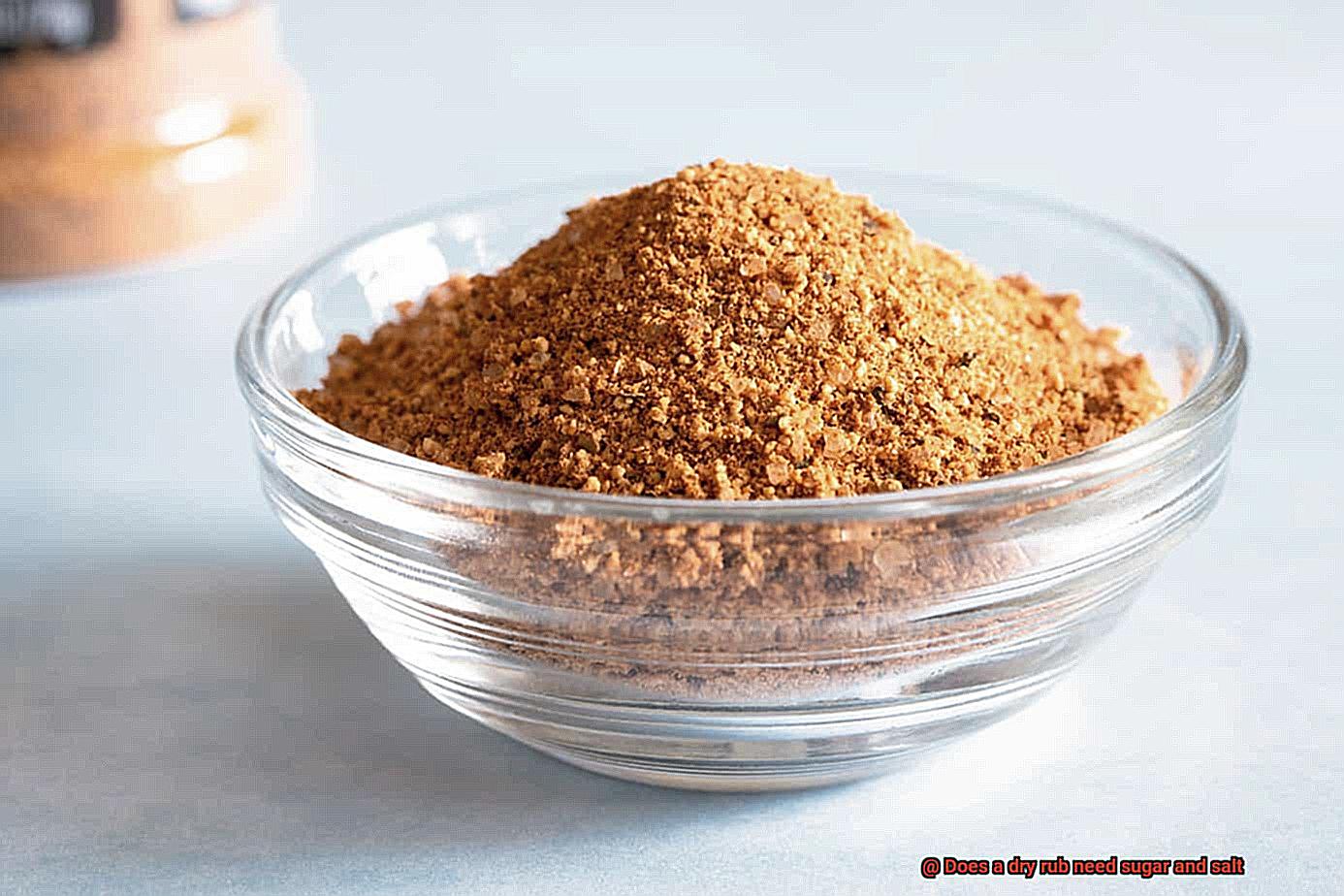
Different Types of Salts for Dry Rubs
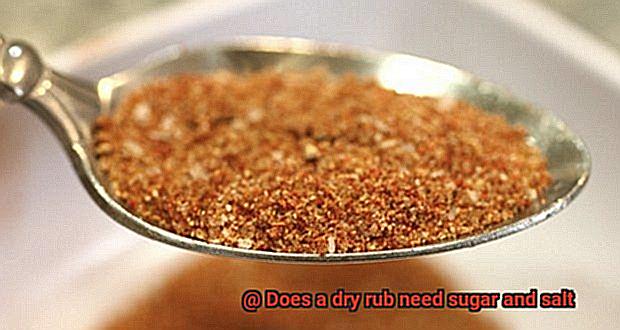
Dry rubs are a game-changer when it comes to infusing grilled meats with irresistible flavors. While sugar and salt are commonly used in dry rubs, there is a whole world of alternative ingredients that can create equally tantalizing taste experiences.
In this article, we will delve into the realm of dry rubs without sugar and explore the unique characteristics of different types of salts that can take your grilling game to new heights.
Kosher Salt: The Magic Crystal
In the realm of dry rubs, kosher salt reigns supreme. With its large crystals and mild flavor, it easily dissolves into meat, evenly spreading its magic. Unlike table salt, kosher salt adds just the right amount of savory essence without overwhelming the taste buds. Its ability to draw out moisture from the meat further enhances the flavor profile, resulting in tender and succulent masterpieces.
Sea Salt: A Briny Symphony
Imagine a symphony of flavors dancing on your palate. That’s what sea salt brings to your dry rubs. Harvested from evaporated seawater, sea salt comes in various forms, each with its own texture and taste. Whether you choose fine, coarse, or flaky sea salt, it imparts a subtle complexity and a touch of brininess to your grilled meats. The trace minerals present in sea salt also contribute to its distinctive flavor and texture.
Himalayan Pink Salt: A Subtle Sweetness
Mined from ancient sea deposits in the Himalayan mountains, the blush-colored Himalayan pink salt adds a touch of elegance to your dry rubs. Its milder flavor compared to other salts allows the natural flavors of the meat to shine through while imparting a subtle hint of sweetness. Rich in minerals, this salt enhances not only the taste but also the visual appeal of your dishes.
Smoked Salt: Infused with the Essence of Fire
If you crave the smoky flavors reminiscent of grilling or smoking, look no further than smoked salt. Crafted through techniques like cold smoking or drying over a wood fire, this salt infuses your dry rubs with a rich and distinctive smokiness. Whether you’re preparing ribs or brisket, smoked salt adds an irresistible depth that will transport your taste buds to barbecue heaven.
Seasoned Salts: A Flavor Explosion in One
For those who seek convenience without compromising taste, seasoned salts are a blessing. These blends of spices and herbs combined with salt offer an all-in-one solution for adding flavor to your dry rubs. From garlic salt to onion salt and celery salt, these seasoned salts provide endless possibilities for creating unique flavor profiles that will elevate your grilling experience.
x1i0ycr7puE” >
Conclusion
In conclusion, when it comes to creating a dry rub, the inclusion of sugar and salt is crucial.
These two ingredients not only enhance the flavor but also play a vital role in the overall texture and tenderness of the meat. The sugar helps to caramelize the surface, creating a beautiful crust and adding a touch of sweetness to balance out the savory flavors.
So, if you want to elevate your barbecue game and achieve mouthwatering results, don’t forget to include sugar and salt in your dry rub recipe.

